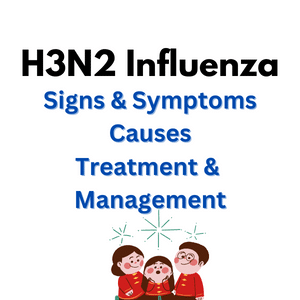
What is H3N2 Influenza?
The flu, or influenza, is a highly contagious respiratory infection caused by influenza viruses. H3N2 is a subtype of the influenza A virus that has been linked to a number of recent flu outbreaks. Here we will go through H3N2 viral infection, symptoms, prevention, and treatment.
Signs & Symptoms of H3N2 Influenza
H3N2 virus infection causes symptoms similar to other kinds of flu. They are as follows:
- Fever
- Cough
- Throat discomfort
- a stuffy or runny nose
- Ache in the body
- Headaches
- Fatigue
- Chills
In severe circumstances, H3N2 virus infection can cause pneumonia, bronchitis, and other respiratory disorders. Little children, older individuals, pregnant women, and persons with specific medical disorders such as asthma, diabetes, and heart disease are at a higher risk of suffering flu complications.
Causes and Transmission of H3N2 Influenza: How the Virus Spreads
The virus that causes H3N2 influenza travels from person to person via respiratory droplets when an infected person coughs, sneezes, or talks. The virus can also live for up to 48 hours on surfaces, making it simple to transmit through contact with contaminated objects. Individuals infected with H3N2 influenza are contagious for up to 7 days after symptoms appear, and sometimes longer in youngsters and persons with compromised immune systems.
Diagnosis of H3N2 Influenza
H3N2 influenza is often diagnosed based on symptoms and a physical exam, but laboratory tests can confirm the virus’s presence.
Prevention of H3N2 Influenza
- The easiest strategy to avoid H3N2 viral infection is to receive a flu vaccine every year. The flu vaccination is intended to protect against the most common influenza virus strains, including H3N2. In addition to getting vaccinated, there are a few additional things you can do to lower your chances of getting the flu:
- Hands should be washed often with soap and water or with an alcohol-based hand sanitizer.
- Avoid close contact with sick persons.
- When coughing or sneezing, cover your mouth and nose.
- If you are sick, stay at home.
Management of H3N2 Influenza
If you become infected with H3N2, there are numerous things you may take to control your symptoms and stop the virus from spreading:
- Relax and drink plenty of water.
- To lower temperature and help discomfort, take over-the-counter drugs such as acetaminophen or ibuprofen.
- To relieve nasal congestion and coughing, use a humidifier or take a hot shower.
- Avoid close contact with others, particularly those who are at high risk of flu complications.
- Your healthcare practitioner may prescribe antiviral drugs such as oseltamivir and zanamivir to treat H3N2 virus infection. These drugs can lessen the severity and length of flu symptoms, as well as assist prevent complications.
Finally, H3N2 virus infection is a form of flu that can cause severe symptoms and complications, especially in high-risk people. Getting a yearly flu vaccine and practicing excellent hygiene habits are the best ways to avoid H3N2 virus infection. If you become infected, rest, remain hydrated, and treat your symptoms with over-the-counter drugs. To prevent the infection from spreading, avoid close contact with people.
Read More About H3N2 Influenza: Click Here
You May Also Like
A Comprehensive Guide to Myositis: Causes, Symptoms, Diagnosis & Treatment
Benefits of Breastfeeding – Click Here